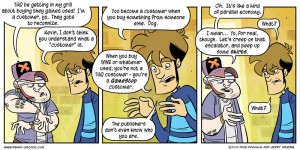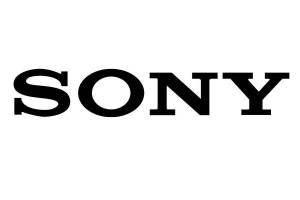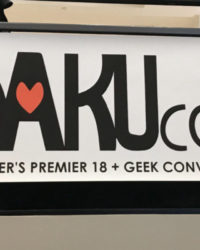When I was younger, maybe back in college or so, video games were sometimes a little cost prohibitive to buy. $50-$60 bucks a pop for games for our favorite consoles was a little steep for us that had an income of roughly nil accompanied with tens of thousands of dollars in debt to repay when we were done our fancy book learnin’. Doubly so for a house of nerds that decided that they could run a game review site without time and without money. So sometimes we would rent, sometimes we would borrow, and sometimes we would buy used to save money whenever stuff went on sale. Granted for PC games we couldn’t really do that (those had, well, different methods of acquisition) but for consoles it was no issue – we grabbed the disc, popped it in our Xbox or PS2 and when we turned it on it worked. Scratched media excluded, there were never really any issues.

original comic here from Penny Arcade
But selling those copies back for store credit and having someone else pick it up used doesn’t make publishers happy. It’s money they could have had with a new sale that they’ve lost, and at the same time it creates a big market that they can’t get their hands in at all. So now it was time for them to get creative. These days in our digital age, with the popularity of DLC for content delivery and online play, publishers are more than ready and able to do a lot of things digitally to pick up additional revenue streams. Let me give you an example – I own a copy of Dead Or Alive 5. If I get bored of it and sell it to a shop or to a friend of mine (let’s call him Sven), that money goes to me, and not Tecmo. So they added a little hook in the pricing model. My new copy came with a key that allows me to play online. But that code links itself to my Xbox Live ID. So having bought my copy, Sven now has to pay for an online pass to play DOA5 to link to his Xbox Live ID. See what Tecmo did there? They put a method in place so that someone buying the game used still had to pay for certain elements of the game. And in this case it’s the online pass. And Sven might even go on to buy some of the DLC character costumes, so look at that! Money Tecmo made on a used game where they would have made none before.
So what’s the next step in how publishers can monetize used games? There could be other methods like the one above that could help publishers extract money from the used games market. But then there are also more extreme options… like trying to kill used games outright. Recently on the NeoGAF forums, we found that the legal eagles at Sony filed a very interesting patent (which you can see here) regarding console games and rights. When it broke, the news of this patent application was received so poorly that GameStop’s stock price actually dropped on the day, with GameStop shareholders selling like mad out of fear of losing one of their core businesses. Funny thing, the internet.
Don’t worry kids, you don’t have to read through that ridiculous amount of text. I’m here to do that for you – and strangely actually kind of like reading patents.
 The patent more or less states that this technology would lock a disc to a specific player ID, the same way my DOA5 online pass has a lock to my Xbox Live ID. If this goes through and is implemented in the PlayStation 4, then a disc, once authorized to a single player, wouldn’t be able to be played by another player, nullifying any value it potentially had in a used games market or sale. How would they do it? The console would write info to a designated blank part of the game disc, putting that link on there. It may sound pretty Spartan in its method, but it’s not really a stretch, seeing as that’s how most digitally delivered games work these days. Just take a look at Steam’s model.
The patent more or less states that this technology would lock a disc to a specific player ID, the same way my DOA5 online pass has a lock to my Xbox Live ID. If this goes through and is implemented in the PlayStation 4, then a disc, once authorized to a single player, wouldn’t be able to be played by another player, nullifying any value it potentially had in a used games market or sale. How would they do it? The console would write info to a designated blank part of the game disc, putting that link on there. It may sound pretty Spartan in its method, but it’s not really a stretch, seeing as that’s how most digitally delivered games work these days. Just take a look at Steam’s model.
But does this mean that they’re actually going to use it? It’s true, applying this technology to the PS4 would indeed lock out a used games market, but there were also rumors that Microsoft was talking about doing something similar a while ago with Project Durango (or Infinity, or 720, or whatever). A lot of companies file for patents that they don’t actually implement. And I have to believe that they know implementing this would shoot themselves in the foot, and they would be giving up more benefits than they would be getting gains, including but not limited to a ridiculous fan backlash.
The whole thing adds a bit more murk to the waters of DRM and used games, especially when an increasing percentage of software doesn’t actually exist on physical media. But one thing I will admit, Sony’s come a long way on their protection technology from being able to be beaten by scotch tape and Sharpie markers.
Tushar Nene
Staff Writer
@tusharnene

















I sure as hell hope not. Those Playstations are already expensive enough, the only thing that’s saved me is buying used games. I can’t afford a new system and a new game every time, and you can bet if they do this Sony will be losing a long time fan.